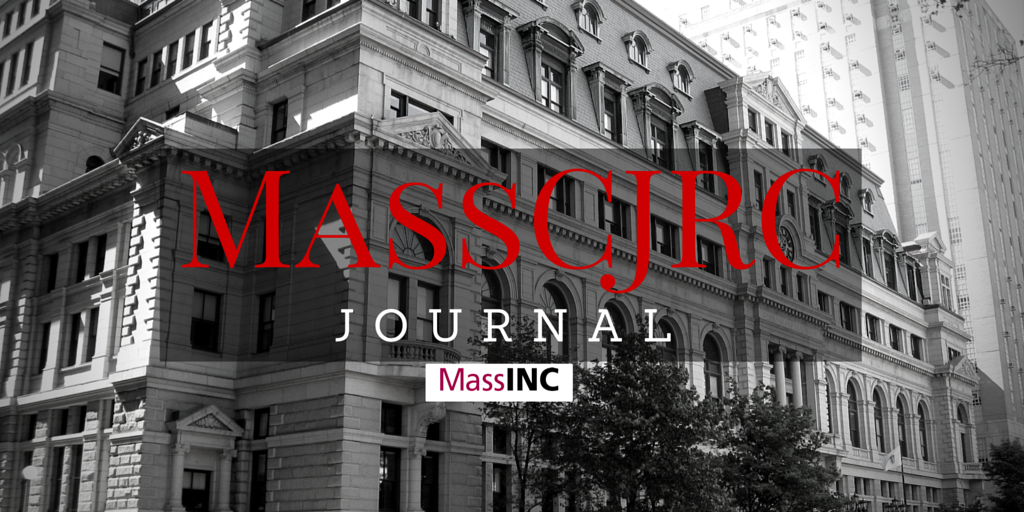Massachusetts state leaders have launched a data-driven “justice reinvestment” approach to develop a policy package for the 2017 legislative session that curbs corrections spending and shifts resources into strategies to reduce recidivism and increase public safety.
Twenty-four other states have carried out this data-driven approach, with intensive technical assistance from The Council of State Governments (CSG) Justice Center in partnership with the U.S Department of Justice’s Bureau of Justice Assistance and The Pew Charitable Trusts. States using a justice reinvestment approach have seen a variety of outcomes, including reductions in prison populations, reallocation of millions of dollars into community-based behavioral health treatment, and declines in probation and parole revocations.
In Massachusetts, state leaders are deeply involved in the justice reinvestment effort. Governor Charlie Baker, Lieutenant Governor Karyn Polito, Chief Justice Ralph Gants, Senate President Stan Rosenberg, and House Speaker Robert DeLeo all serve on the project’s steering committee. A 25-member working group provides additional project support and guidance and includes designees from all three branches of government as well as state and local criminal justice stakeholders.
The steering committee has determined that the initial scope of Massachusetts’s justice reinvestment project will include investigating the drivers of incarceration, identifying recidivism trends across the system, and assessing the effectiveness of community supervision.
At the first working group meeting, held on January 12 at the Statehouse, CSG Justice Center staff provided some initial findings about the state’s criminal justice system, including:
- The total incarcerated population has decreased 12 percent over the last decade, driven by a reduction in the county-operated houses of corrections population. The prison population, by contrast, increased 3 percent during the same time period.
- Few measures of recidivism for people in the criminal justice system are routinely calculated and reported in Massachusetts.
- People on probation and parole supervision account for three-quarters (about 70,000 people) of those who are under some form of correctional supervision in the state.
- 40 percent of people incarcerated in state prison do not receive supervision when they return to their communities upon release.
CSG Justice Center staff have begun analyzing hundreds of thousands of data records made available by various state agencies, including the Trial Courts, the Office of the Commissioner of Probation, the Department of Corrections, and the Parole Board. Analyses are likely to cover such topics as demographics and characteristics of incarcerated populations, bail and pretrial practices, sentencing policies, policies related to criminal justice fines and fees, and how and when people involved with the criminal justice system who have behavioral health disorders are connected to treatment. During future working group meetings, CSG Justice Center staff will deliver findings related to these and other aspects of Massachusetts’s criminal justice system.
In the fall of this year, the steering committee and working group will focus on developing a data-driven policy framework that can serve as the basis for legislation.
The next working group meeting is scheduled for April 12. The first working group presentation, an overview publication, and other materials can be found on the CSG Justice Center’s Massachusetts webpage.
– Council on State Governments
MASSACHUSETTS
WBUR covers CSG’s first presentation. CommonWealth (here) and the Boston Globe also provide coverage (and here).
Gov. Charlie Baker signs a bill ensuring that women who are civilly committed for substance abuse disorders will be sent to a treatment facility, not to prison.
More mothers convicted of drug crimes in Massachusetts are being directed to treatment rather than jails.
Attorney General Loretta Lynch looks to Boston to reduce recidivism. She also pays a visit to Harvard Law School to ask students to consider ways in which they can lead reform of the criminal justice system.
IN THE STATES
Alaska turns to criminal justice reform to counter falling oil revenues. A bill aimed at reducing prison populations by 21 percent will reach the legislature by late January.
Gov. Andrew Cuomo is earning a legacy far different than his father’s, having closed more prisons than any other governor in New York State history, and introducing further reforms in his State of the State address.
A New York Times editorial commends the work done by Connecticut Governor Dannel Malloy in criminal justice reform, and highlights his proposed measures to reform the juvenile justice system and the bail system, set to come before the legislature this year.
Iowa legislators consider “banning the box” on job applications, prohibiting employers to ask about an applicant’s criminal history until later in the interview process.
Governor Bruce Rauner meets with the Illinois State Commission on Criminal Justice and Sentencing Reform to hear their first set of recommendations.
IN THE MEDIA
Carl Hulse of the New York Times cites the infamous Willie Horton ad as an obstruction to bipartisan criminal justice reform in a year where control of Congress is at stake.
The Marshall Project outlines where each of the Democratic and Republican Candidates stand on criminal justice issues.
A group of former federal prosecutors and government officials send a letter to Senate leadership, in which they endorse Sen. Grassley’s criminal justice reform bill.
The U.S. Senate Judiciary Committee will hold a public hearing on whether to expand the types of crimes for which mens rea is necessary for conviction.
Shaka Senghor delivers a compelling TED Talk on his experiences within the criminal justice system, and his journey since.
FROM THE RESEARCHERS
Massbudget sees long-term increases, recent progress in latest research paper analyzing incarceration trends in Massachusetts over the past four decades.
New research from RAND once again confirms the benefits of correctional programming.
The Brennan Center finds crime is not on the rise.
Criminal Justice Policy Review publishes a special issue focused on justice-involved offenders with mental health disorders.
